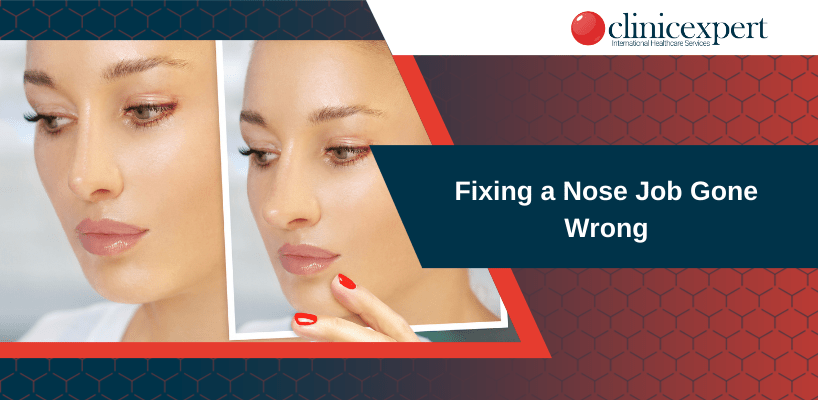Rhinoplasty Procedure
As the central and defining feature of the face, the nose holds immense aesthetic importance. Rhinoplasty, a plastic surgery procedure, offers the opportunity to reshape and resize the nose, including the removal or reduction of a dorsal hump. You can achieve facial harmony with a nose job. While performed by highly skilled and board-certified facial plastic surgeons, it produces seamless alterations and desired results. Nevertheless, it is a delicate process. Unfortunately, sometimes a nose job can go wrong, necessitating revision surgery for improved results.
What if My Nose Job Goes Wrong?
If you are visiting a reputable doctor, a sterile clinic, and if you are doing all you can to look after your nose post-operation, then your nose job will probably not go wrong. Make sure to contact your doctor immediately if you are worried about it.
In any case, here are some signs that your nose job went wrong:
- Having difficulty breathing even after a few weeks
- Nose looking crooked, or pinched from the top
- Infection or never-ending bleeding
- Droopy nose
- Numbness on the nose might be an indicator of nerve damage
- Asymmetrical or disproportionate appearance
- Wide bridge
The Causes of a Botched Nose Job
Wrong Rhinoplasty Surgeon
Choosing the right rhinoplasty surgeon is vital to the success of your nose job. Opting for an experienced and specialized plastic surgeon is key to achieving your desired results. Take your time to carefully select a qualified professional who meets the necessary criteria for the best outcomes. Otherwise, you might have to face with a botched nose job.
Neglecting the Doctor’s Recommendations
Strict adherence to your doctor’s pre- and post-operative instructions is essential. Following these guidelines diligently greatly influences the success of your cosmetic nose surgery. Neglecting or disregarding the doctor’s recommendations can increase the risk of having a nose job gone wrong.
Thick Nose Skin
Having excessively thick skin on the nose (bulbous nose) can pose challenges in achieving desired results. Surgical interventions may be more difficult to manifest in individuals with thick skin. The majority of the patients who had a botched nose job, have thick skin. Therefore, individuals with thick skin should exercise additional caution when selecting a plastic surgeon who has experience in dealing with thick-skinned noses. You can find more details on rhinoplasty for thick-skinned noses below.
Incompatible Results
A crucial aspect of successful rhinoplasty is ensuring that the new nose shape harmonizes with the patient’s facial features. Each face is unique, and the nose surgery should be performed considering the patient’s individual facial structure. Emulating the nose of a celebrity you admire may not lead to a successful outcome. Therefore, striving for the golden ratio becomes important.
Not Protecting Your Nose
After undergoing nose surgery, it is crucial to take precautions to protect your nose from any blows or injuries. Especially during the initial months when the nose is still in the healing and reconstruction phase, it is important to be extra cautious and avoid any trauma to the nasal area.
Signs and Symptoms of a Bad Nose Job
Low Nasal Bridge
A surgeon lacking experience might have overly removed nasal bone and cartilage, resulting in a very low nasal bridge. Excessive tissue removal from the inside of your nose may have compromised the internal support structure, leading to a collapsed appearance.
Overly Elevated Nasal Tip
Excessive shortening of the nose during surgery can lead to a nasal tip that is positioned too high, resulting in an unflattering “pig snout” appearance. While some temporary swelling may occur post-surgery, if the high nasal tip persists long-term, finding a skilled surgeon for correction can be challenging.
Imbalanced Proportions
An obvious sign of a poorly executed nose job is when the size of your nose appears disproportionate to the rest of your face. Whether it’s too small or too large, consult an experienced rhinoplasty surgeon who can restore the harmonious and proportionate size of your nose.
Incorrect Nostril Size
If you notice that your nostrils are either excessively large or too small, it may indicate that your surgeon has inappropriately shortened your nose. Additionally, they might have overlooked the width of the nostril floor, leading to improper adjustments.
Breathing Difficulties
Experiencing difficulty in breathing after a rhinoplasty indicates an underlying problem. We often observe this in cases of overly aggressive reduction rhinoplasty. It is crucial to seek a reputable surgeon who can ensure proper function and maintain the integrity of the external and internal nasal passages.
The Power of Revision Rhinoplasty
You may need a revision rhinoplasty to address the issues that came from the bad rhinoplasty. Revision rhinoplasty is also known as secondary rhinoplasty. It holds the power to transform and correct the results of a previous nose surgery. The importance of revision rhinoplasty lies in its ability to provide patients with a renewed sense of confidence and harmony in their facial features. It requires the expertise of a skilled and experienced plastic surgeon who possesses a deep understanding of the intricate nasal anatomy and the complexities associated with revision procedures.
Revision rhinoplasty is a highly personalized procedure, as each patient presents a unique set of challenges and goals. The surgeon’s expertise and artistic vision are crucial in achieving a natural and balanced outcome that enhances the patient’s facial harmony and restores their confidence.
Revision rhinoplasty is a more complex procedure than the initial surgery. But, advancements in surgical techniques and technologies have significantly improved its success rates. However, it is essential for patients considering revision rhinoplasty to have realistic expectations and understand that achieving the desired outcome may require multiple surgical interventions. If you want to achieve the results you desire, contact our medical experts via WhatsApp. When a nose job is gone wrong, patients are reluctant towards undergoing another surgery. We guarantee that you won’t have to worry about the quality of work done once you hire the right surgeon and the team.

